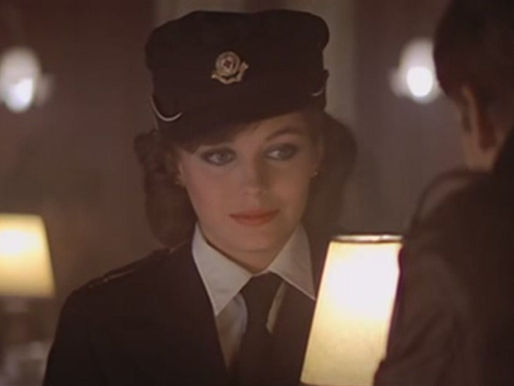top of page
Search
Golden Age Brits
Articles relating to British talent within the film Industry.
Including, Actors, Directors, Writers etc


The Muppet Christmas Carol (1992)
Few adaptations of Charles Dickens’ timeless novella have enjoyed the enduring affection bestowed upon A Muppet Christmas Carol. Released in 1992 and directed by Brian Henson—son of the legendary Jim Henson, for whom this was the first feature film after his father’s death—the film manages a delicate feat: it remains faithful to the spirit and moral depth of Dickens while embracing the irreverent humour, heart, and musical exuberance of the Muppets.

Soames Inscker
4 min read


Yesterday’s Enemy (1959)
When Yesterday’s Enemy was released in 1959, audiences accustomed to Hammer Films’ lurid gothic horrors might have been surprised by its stark realism and moral gravity. Directed by Val Guest, the film eschews monsters, castles, and melodrama for something far more chilling — a study of the psychological and ethical toll of war.

Soames Inscker
5 min read
Val Guest
Val Guest occupies a distinctive and often underappreciated place in the history of British film. A director, writer, and occasional actor whose career spanned more than five decades, Guest’s work defies easy categorisation.

Soames Inscker
5 min read


The Day the Earth Caught Fire (1961)
Released in 1961, The Day the Earth Caught Fire stands as one of the finest examples of British science fiction cinema — intelligent, grounded, and deeply human. Directed and co-written by Val Guest, who had already made his mark with The Quatermass Experiment, the film combines the urgency of Cold War politics with the immediacy of newsroom realism. What results is a gripping, thought-provoking disaster film that feels both of its time and eerily prescient.

Soames Inscker
4 min read


The Quatermass Experiment (1955)
When The Quatermass Experiment was released in 1955, British science fiction was still a relatively unexplored genre in cinema. While America had already embraced flying saucers, atomic monsters, and Cold War paranoia, the United Kingdom’s screen science fiction had been more restrained and intellectual.

Soames Inscker
4 min read


The Runaway Bus (1954)
The 1954 British comedy–thriller The Runaway Bus stands as a fine example of post-war British studio filmmaking at its most inventive and unpretentious. Directed and written by Val Guest and produced by Marble Arch Productions for the Rank Organisation, the film blends farce, suspense, and a touch of absurdity into an engagingly eccentric romp.

Soames Inscker
5 min read


The Flight of the Phoenix (1965)
Robert Aldrich’s The Flight of the Phoenix (1965) remains one of the most compelling and unconventional survival dramas ever committed to film — a taut, psychological study of men under pressure, wrapped in a thrilling and meticulously constructed adventure.

Soames Inscker
5 min read


Hanover Street (1979)
Released in 1979, Hanover Street is a wartime romantic drama that blends espionage, adventure, and an impassioned love story, set against the turbulent backdrop of the Second World War.

Soames Inscker
5 min read


Lesley-Anne Down
Lesley-Anne Down has long been one of Britain’s most elegant and versatile screen performers, her career spanning film, television, and modelling with a poise and professionalism that have made her a familiar and enduring presence both in the UK and internationally.

Soames Inscker
5 min read


The First Great Train Robbery (1978)
Michael Crichton’s The First Great Train Robbery (released simply as The Great Train Robbery in some territories) is a delightfully crafted caper film that blends historical authenticity, dry wit, and old-fashioned adventure. Based on Crichton’s own 1975 novel, itself inspired by the true events of the 1855 Great Gold Robbery, the film captures the ingenuity and daring spirit of the Victorian age with panache.

Soames Inscker
3 min read


Sir Noël Coward
Few figures embody the sophistication, intelligence, and artistry of twentieth-century British culture as completely as Sir Noël Coward. Playwright, actor, composer, singer, director, and raconteur, Coward was not merely a man of the theatre—he was an institution. His name became synonymous with urbane wit, style, and precision, and his influence extended far beyond the stage to film, music, and even fashion.

Soames Inscker
6 min read


In Which We Serve (1942)
Few films capture the courage, resilience, and quiet heroism of wartime Britain as powerfully as In Which We Serve. Released in 1942, at the height of the Second World War, this landmark film remains one of the defining works of British cinema—a deeply moving tribute to the Royal Navy and to the ordinary men and women who endured the trials of war with steadfast dignity.

Soames Inscker
6 min read
Tony Richardson
Few figures in post-war British cinema embody the spirit of rebellion, innovation, and artistic daring quite like Tony Richardson. As a director, producer, and co-founder of the revolutionary production company Woodfall Films, Richardson helped transform the landscape of British film during the late 1950s and 1960s.

Soames Inscker
5 min read


The Charge of the Light Brigade (1968)
Tony Richardson’s The Charge of the Light Brigade (1968) is one of the most audacious and intellectually provocative historical war films of its era. Far from being a simple retelling of the infamous cavalry charge during the Crimean War, the film is a searing, darkly satirical examination of the British class system, military incompetence, and the crumbling ideals of Victorian imperialism.

Soames Inscker
5 min read


The Sea Wolves (1980)
Released in 1980, The Sea Wolves is a stirring, old-fashioned wartime adventure directed by Andrew V. McLaglen. Starring an illustrious ensemble of veteran British actors—Gregory Peck, Roger Moore, David Niven, and Trevor Howard—it offers a nostalgic return to the style of the classic war films of the 1950s and 1960s, even as cinema was moving towards grittier, more cynical portrayals of conflict.

Soames Inscker
4 min read


Camelot (1967)
Joshua Logan’s Camelot (1967) stands as one of the most lavish and ambitious film musicals of its era — a sweeping adaptation of the celebrated Lerner and Loewe stage show that sought to bring the Arthurian legend to life through song, spectacle, and romance.

Soames Inscker
5 min read


The Wild Geese (1978)
Andrew V. McLaglen’s The Wild Geese stands as one of the most iconic British war adventure films of the 1970s — a bold, muscular production that combines old-fashioned heroics, moral ambiguity, and gritty realism. Released in 1978, it features an ensemble of legendary actors including Richard Burton, Richard Harris, Roger Moore, and Hardy Krüger. The result is an engaging, if sometimes dated, blend of action, camaraderie, and commentary on the murky world of mercenary warfare

Soames Inscker
5 min read


Star Wars: Episode I – The Phantom Menace (1999)
When George Lucas returned to the galaxy far, far away in 1999 with Star Wars: Episode I – The Phantom Menace, it marked one of the most anticipated cinematic events in history. Sixteen years had passed since Return of the Jedi (1983), and the weight of expectation was immense. Fans hoped to see the origins of the saga’s mythic conflict, the rise of Darth Vader, and the early days of the Jedi Order.

Soames Inscker
6 min read


Robin Hood: Prince of Thieves (1991)
Directed by Kevin Reynolds and starring Kevin Costner, Robin Hood: Prince of Thieves is one of the most iconic swashbuckling adventures of the early 1990s. Released in 1991, it reimagines the classic English legend with a distinctly Hollywood flair — blending grand spectacle, sweeping romance, and gritty medieval realism. While often remembered as much for its flaws as its triumphs, the film remains a lavish and entertaining take on one of Britain’s most enduring folk heroes.

Soames Inscker
5 min read


A Place in the Sun (1951)
George Stevens’s A Place in the Sun (1951) is one of the most powerful romantic dramas of mid-century American cinema, a haunting exploration of ambition, passion, and moral collapse. Based on Theodore Dreiser’s monumental novel An American Tragedy (1925), itself inspired by a real murder case, the film updates Dreiser’s tale to post-war America and captures both the glittering promise and the destructive undercurrents of the “American Dream.”

Soames Inscker
4 min read
bottom of page


